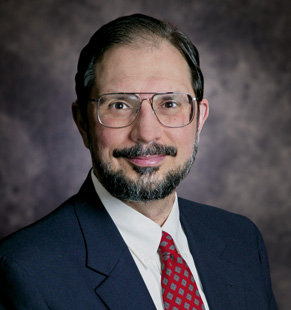Dr. Russell A. Hulse
- Former Regental Professor
- Former Associate Vice President for Strategic Initiatives

The University of Texas System supports the professorship.
Hulse is a physicist and winner of the 1993 Nobel Prize in Physics for the discovery of the first binary pulsar.
“UT Dallas is an exciting place to be. I am particularly grateful for the strong support I’ve received from the University and the community, which has allowed me to create a significant science and engineering education outreach program at UT Dallas.”
Dr. Russell Hulse is a physicist whose research career has ranged from pulsar radio astronomy to computer modeling of controlled thermonuclear fusion plasmas. His current efforts include a focus on science and engineering education outreach programs.
He joined the faculty of UT Dallas in 2004. This appointment made him the third Nobel Laureate faculty member in UT Dallas history. Hulse won the Nobel Prize for the discovery of the first binary pulsar – a twin star system that provides a rare natural laboratory in which to test Albert Einstein’s prediction that moving objects emit gravitational waves, as well as other aspects of his general theory of relativity. The discovery was made in 1974 by Hulse, a 23-year-old graduate student at the time, and his thesis advisor, Dr. Joseph Taylor Jr., then a professor at the University of Massachusetts at Amherst. The pair shared the physics prize in 1993.
The groundbreaking discovery of the binary pulsar – ranked by many as among the top scientific discoveries of the 20th century – has had a significant impact on astrophysics and gravitational physics research.
In 1977, Hulse changed fields from astrophysics to plasma physics and joined the Plasma Physics Laboratory at Princeton.
Hulse is the Founding Director of the UT Dallas Science and Engineering Education Center (SEEC), which develops and implements a range of STEM (Science, Technology, Engineering, Math) education outreach programs.
“UT Dallas has shown a strong commitment to contributing to its local communities through such science outreach programs, which is what attracted me here to help make such programs a reality,” Hulse said.
A native of the Bronx, N.Y., Hulse earned a bachelor’s degree in physics in 1970 from the Cooper Union for the Advancement of Science and Art in Manhattan. He received a PhD in physics in 1975 from the University of Massachusetts at Amherst. He was awarded a postdoctoral appointment at the National Radio Astronomy Observatory in Charlottesville, Va. He then carried out research at Princeton University’s Plasma Physics Laboratory for 30 years before taking his current position at UT Dallas.